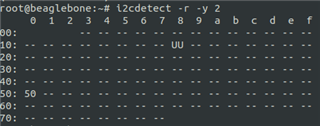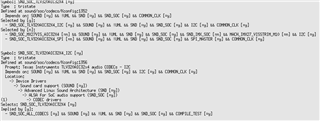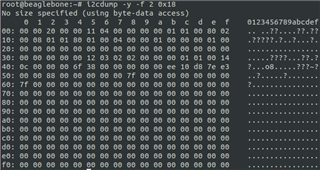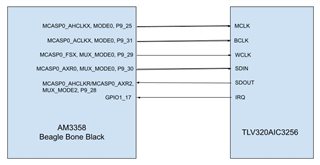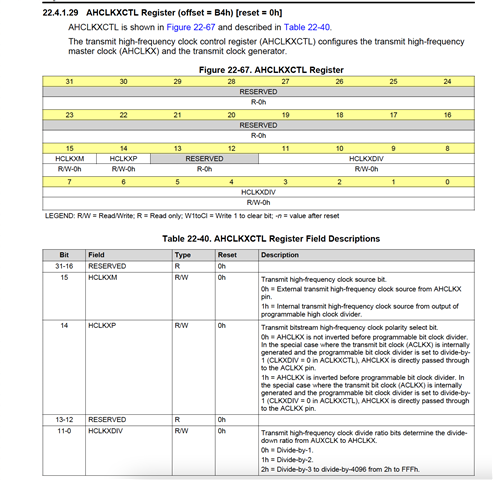Other Parts Discussed in Thread: TLV320AIC3256, TLV320AIC3256EVM-U, AM3358, TLV320AIC3106
Hi,
We are trying to configure TLV320AIC3256 Audio Codec with Beagle Bone Black Rev C.
Following are the DT node changes we made:
&i2c2 {
status = "okay";
//tda19988: tda19988@70 {
// compatible = "nxp,tda998x";
// reg = <0x70>;
// nxp,calib-gpios = <&gpio1 25 0>;
// interrupts-extended = <&gpio1 25 IRQ_TYPE_LEVEL_LOW>;
//
// pinctrl-names = "default", "off";
// pinctrl-0 = <&nxp_hdmi_bonelt_pins>;
// pinctrl-1 = <&nxp_hdmi_bonelt_off_pins>;
/* Convert 24bit BGR to RGB, e.g. cross red and blue wiring */
/* video-ports = <0x234501>; */
// #sound-dai-cells = <0>;
// audio-ports = < TDA998x_I2S 0x03>;
// ports {
// port@0 {
// hdmi_0: endpoint@0 {
// remote-endpoint = <&lcdc_0>;
// };
// };
// };
//};
tlv320aic32x6: tlv320aic32x6@18 {
status = "okay";
compatible = "ti,tlv320aic32x6";
reg = <0x18>;
ldoin-supply = <®_audio_3v3>;
iov-supply = <®_audio_3v3>;
};
};
sound {
...
simple-audio-card,codec {
sound-dai = <&tlv320aic32x6>;
};
...
};
reg_audio_3v3: regulator-audio-3v3 {
compatible = "regulator-fixed";
regulator-name = "VCC3V3_AUDIO";
regulator-min-microvolt = <3300000>;
regulator-max-microvolt = <3300000>;
regulator-always-on;
};
&am33xx_pinmux {
...
mcasp0_pins: mcasp0_pins {
pinctrl-single,pins = <
AM33XX_PADCONF(AM335X_PIN_MCASP0_AHCLKX, PIN_INPUT_PULLUP, MUX_MODE0) /* mcasp0_ahcklx.mcasp0_ahclkx */
AM33XX_PADCONF(AM335X_PIN_MCASP0_AHCLKR, PIN_OUTPUT_PULLDOWN, MUX_MODE2) /* mcasp0_ahclkr.mcasp0_axr2*/
AM33XX_PADCONF(AM335X_PIN_MCASP0_FSX, PIN_OUTPUT_PULLUP, MUX_MODE0)
AM33XX_PADCONF(AM335X_PIN_MCASP0_ACLKX, PIN_OUTPUT_PULLDOWN, MUX_MODE0)
AM33XX_PADCONF(AM335X_PIN_MCASP0_AXR0, PIN_OUTPUT_PULLDOWN, MUX_MODE0)
AM33XX_PADCONF(AM335X_PIN_GPMC_A11, PIN_OUTPUT_PULLDOWN, MUX_MODE7) /* gpmc_a11.GPIO1_27 */
>;
};
...
};
We have made the following connections between the Audio Codeck EVK and BBB:
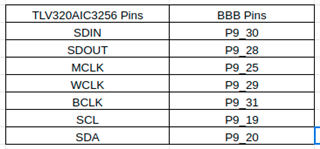
We are receiving this error during the kernel boot up: 'tlv320aic32x4 2-0018: Failed to parse DT node'
We are also not able to figure out if we need to add I2C2 pins config in the DT because in am335x-boneblack.dts we see in Port 0 pins i2c2 mentioned,
&gpio0 {
gpio-line-names =
...
"P9_20 [i2c2_sda]",
"P9_19 [i2c2_scl]",
...;
};


